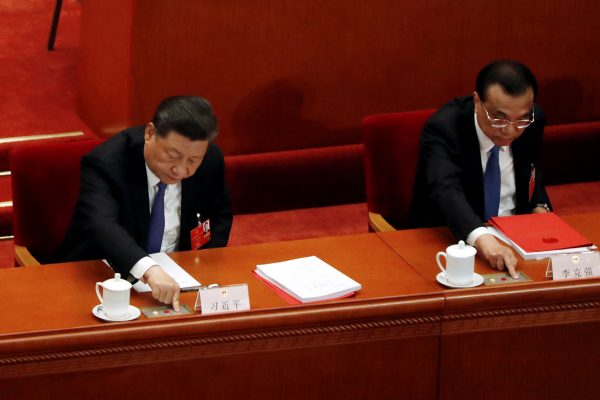Two major decisions came out of this year’s NPC.
First, the government adopted a series of measures designed to promote economic recovery following the COVID-19 crisis. The most prominent of these included dropping the annual GDP target for the first time in thirty years, and replacing it with a target unemployment rate of 6 per cent for China’s urban areas. This move will give Chinese policymakers greater flexibility to pursue economic recovery; so long as unemployment stays in line with the target rate, policymakers will no longer need to introduce large stimulus packages simply to meet a fixed growth target. Other measures included a renewed commitment to reform of state-owned enterprises and opening up additional parts of the domestic economy to foreign investment.
Second, the NPC took the decision to draft a new law to ‘Safeguard National Security’ in Hong Kong. The national security law, which will likely be implemented before September, is expected to criminalise a range of activities including: secession, subversion of the central government’s power, terrorism, and activities by ‘foreign and overseas forces’ deemed to interfere in Hong Kong. Its effect will be to significantly curtail a range of political rights and freedoms, such as freedom of assembly, speech and association, that are currently protected under Hong Kong law.
In the first of our lead essays this week, Jeppe Mulich argues that by circumventing both the Hong Kong Legislative Council and Article 23 of the Hong Kong Basic Law, ‘the NPC decision is almost certainly unconstitutional’. Yet ‘neither Beijing nor the pro-Beijing political establishment in Hong Kong care much about its legality’, says Mulich.
Instead, Beijing appears willing to irrevocably alter the idea of ‘one country, two systems’ — the political agreement underpinning the 1984 Sino-British Joint Declaration, which was designed to guarantee distinct political and economic rights and freedoms for Hong Kong.
As Kerry Brown explains in another of our lead essays this week, Beijing’s decisions at the NPC reveal the disconnect at the heart of global assessments of a more powerful China: ‘seemingly so essential economically and so impossible politically’.
China has the potential to be the steward of global economic openness and a driver of global economic growth — both major public goods. But its willingness to stamp out Hong Kong’s autonomy further erodes many states’ comfort with Chinese power. Raw power is one thing, legitimate authority quite another. While China would prefer to obtain the latter, its NPC ruling this week has tainted its bid for global authority, not only in the West, but also among many states in Asia.
In response to the NPC decision, the United States, United Kingdom, Canada and Australia quickly issued a joint statement expressing extreme concern that the national security law lies in ‘direct conflict’ with China’s international obligations under the ‘legally-binding, UN-registered Sino-British Joint Declaration’, and that the law will ‘exacerbate the existing deep divisions in Hong Kong society’.
Japan, too, has raised ‘serious concerns’ that the NPC decision undermines Hong Kong’s special autonomy and freedoms, citing the ‘extremely important’ economic and people-to-people ties it enjoys with Hong Kong. There has been less public protest from China’s other neighbours.
The United States and United Kingdom have also taken steps that signal the hardening of their relations with China.
Following the NPC decision, US Secretary of State Mike Pompeo declared that Hong Kong no longer ‘maintains a high degree of autonomy from China’, a statement that paved the way for US President Donald Trump to announce that he will revoke Hong Kong’s special status under US law. Though specific details of these threatened arrangements have yet to emerge, removal of this status would jeopardise billions of dollars’ worth of trade and investment with Hong Kong, harming Hong Kong, US and Chinese economic interests at the same time.
Ironically, Kerry Brown reminds us that Washington and Beijing now ‘speak the same language’ when it comes to their strident focus on reducing COVID-19-related unemployment. Yet this shared goal seems unlikely to compel greater economic or other cooperative moves between the United States and China. Prominent Chinese academics and government-affiliated think tank officials have also acknowledged that the Hong Kong law will further antagonise US–China relations.
In the UK, the NPC decision prompted the British government to offer a path to citizenship to more than three million Hong Kong citizens who still hold British National (Overseas) status. It’s a move that demonstrates just how far the UK–China relationship has deteriorated since former prime minister David Cameron proclaimed a ‘golden era’ in relations.
Ultimately, the effects of the NPC decisions last week will be felt deeply in two very different arenas.
In Hong Kong, it is Beijing’s hope that the national security laws will fundamentally change the calculation for young people and protestors across the city, making them realise that it is no longer in their interests or power to alter Hong Kong’s political fate. But as Mulich reminds us, ‘the city is not ready to go silently into the night. Large-scale protests erupted over the weekend, after months of quiet during the pandemic, and more are sure to follow over the coming weeks’.
Globally, the NPC decisions will put in place economic reforms and measures that will be critically important to reviving China’s economy and that of its economic partners. Just as importantly though, the Hong Kong law could have negative ramifications for China’s global political authority, which may be felt for decades to come.
The EAF Editorial Board is located in the Crawford School of Public Policy, College of Asia and the Pacific, The Australian National University.

